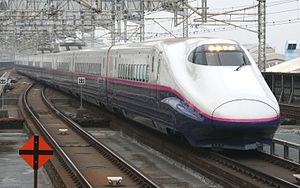- Nasuno
-
Nasuno 
E2 series on a Nasuno service, February 2011 Service type Shinkansen Operator JR East Line used Tōhoku Shinkansen Maximum speed 240 km/h (150 mph) Started 1959 (Semi-express)
1995 (Shinkansen)Rolling stock 200 series, E2 series, E3 series, E4 series The Nasuno (なすの) is a train service operated on the Tōhoku Shinkansen by East Japan Railway Company (JR East) in Japan.[1] It serves all stations between Tokyo and Kōriyama, a medium-sized city approximately 225 km north of Tokyo.[2]
Contents
History
The name Nasuno was first introduced on 22 September 1959 for semi-express (準急 junkyū) services operating between Ueno in Tokyo and Kuroiso on the Tōhoku Main Line. In 1966, this was upgraded to become an express (急行 kyūkō), and on 14 March 1985, it was upgraded to become a Limited express using 185 series EMU rolling stock. From 10 March 1990, the train was rerouted to operate between Shinjuku in Tokyo and Kuroiso.[3]
On 10 December 1995, the name was adopted for the new all-stations services on the Tōhoku Shinkansen.[1] The Tōhoku Main Line services to/from Shinjuku were renamed Ohayō Tochigi and Hometown Tochigi from this date. Prior to 1995, Aoba services formed the all-stations services along the whole line. However, with the introduction of short-distance Nasuno services, Aoba services were reduced, and in 1997, discontinued altogether, with the local services covered by Nasuno as far as Kōriyama, and all further stations served by the Yamabiko.
Origin
The name Nasuno is derived from the Nasu Highlands (那須高原) and Nasu Onsen (那須温泉) areas located alongside the Tōhoku Shinkansen between Utsunomiya and Kōriyama.
Operations
There are approximately 16 return Nasuno services daily, starting/terminating either at Oyama, Nasushiobara, or Kōriyama. Double-decker Nasuno services formed of E4 series sets also operate, named Max Nasuno. Nasuno services stop at all stations en route.
References
External links
- 200 series Yamabiko/Toki/Nasuno/Tanigawa (Japanese)
- E2 series Hayate/Yamabiko/Nasuno (Japanese)
- E4 series Max Yamabiko/Max Nasuno (Japanese)
Shinkansen Lines in service Main lines Mini-Shinkansen
Future lines Cancelled lines Service names In service Discontinued Aoba • AsahiTrainsets In service 100 Series • 200 Series • 300 Series • 500 Series • 700 Series • N700 Series • 800 Series • E1 Series • E2 Series • E3 Series • E4 Series • E5 SeriesOn order E6 Series • L0 seriesRetired Export trainsets Non-revenue
earning trainsetsClass 1000 • Class 951 • Class 961 • Class 962 • Doctor Yellow • WIN350 • STAR21 • 300X • Fastech 360 • Gauge Change Train • MLX-01Operators Named trains of East Japan Railway Company Shinkansen 
Limited express (daytime) Akagi · Akita Relay · Ayame · Azusa · Fresh Hitachi · Hakuchō · Hakutaka · Hatsukari · Hokuetsu · Hometown Tochigi · Inaho · Kaiji · Kamoshika · Kinugawa · Komakusa · Kusatsu · Minakami · Minori · Narita Express · Nikkō · Odoriko · Ohayō Tochigi · Sazanami · Shiosai · Spacia Kinugawa · Super Azusa · Super Hakuchō · Super Hatsukari · Super Hitachi · Super View Odoriko · Tazawa · Tsugaru · Wakashio · Weekend AkagiLimited express (overnight) Express Rapid Airport Narita · Aizu Liner · Kubikino · Moonlight Echigo · Moonlight Nagara · Moonlight Shinshū · Musashino (partial list)Liner
Categories:- East Japan Railway Company
- Shinkansen
- Tōhoku Shinkansen
- Named passenger trains of Japan
- 1959 introductions
Wikimedia Foundation. 2010.

